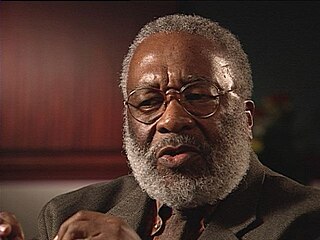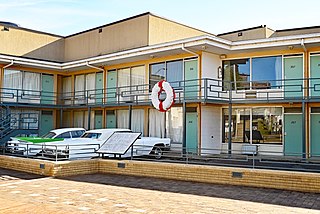
Martin Luther King Jr. was an American Baptist minister, activist, and political philosopher who was one of the most prominent leaders in the civil rights movement from 1955 until his assassination in 1968. A black church leader and a son of early civil rights activist and minister Martin Luther King Sr., King advanced civil rights for people of color in the United States through the use of nonviolent resistance and nonviolent civil disobedience against Jim Crow laws and other forms of legalized discrimination.

The civil rights movement was a social movement and campaign from 1954 to 1968 in the United States to abolish legalized racial segregation, discrimination, and disenfranchisement in the country. The movement had its origins in the Reconstruction era during the late 19th century and had its modern roots in the 1940s, although the movement made its largest legislative gains in the 1960s after years of direct actions and grassroots protests. The social movement's major nonviolent resistance and civil disobedience campaigns eventually secured new protections in federal law for the civil rights of all Americans.
Justificatio sola fide, meaning justification by faith alone, is a soteriological doctrine in Christian theology commonly held to distinguish the Lutheran and Reformed traditions of Protestantism, among others, from the Catholic, Eastern Orthodox, Oriental Orthodox, Assyrian and Anabaptist churches. The doctrine asserts that it is on the basis of faith alone that believers are made right of sin ; and not on the basis of what Paul the Apostle calls "works of the law", which sola fide proponents interpret as including not only moral, legal or ceremonial requirements but any good works or "works of charity."

The Montgomery bus boycott was a political and social protest campaign against the policy of racial segregation on the public transit system of Montgomery, Alabama. It was a foundational event in the civil rights movement in the United States. The campaign lasted from December 5, 1955—the Monday after Rosa Parks, an African-American woman, was arrested for her refusal to surrender her seat to a white person—to December 20, 1956, when the federal ruling Browder v. Gayle took effect, and led to a United States Supreme Court decision that declared the Alabama and Montgomery laws that segregated buses were unconstitutional.

The "Letter from Birmingham Jail", also known as the "Letter from Birmingham City Jail" and "The Negro Is Your Brother", is an open letter written on April 16, 1963, by Martin Luther King Jr. It says that people have a moral responsibility to break unjust laws and to take direct action rather than waiting potentially forever for justice to come through the courts. Responding to being referred to as an "outsider", King writes: "Injustice anywhere is a threat to justice everywhere."

The Southern Christian Leadership Conference (SCLC) is an African-American civil rights organization based in Atlanta, Georgia. SCLC is closely associated with its first president, Martin Luther King Jr., who had a large role in the American civil rights movement.
Racial equality is when people of all races and ethnicities are treated in an egalitarian/equal manner. Racial equality occurs when institutions give individuals legal, moral, and political rights. In present-day Western society, equality among races continues to become normative. Prior to the early 1960s, attaining equality was difficult for African, Asian, and Indigenous people. However, in more recent years, legislation is being passed ensuring that all individuals receive equal opportunities in treatment, education, employment, and other areas of life. Racial equality can refer to equal opportunities or formal equality based on race or refer to equal representation or equality of outcomes for races, also called substantive equality.

Ich und Du, usually translated as I and Thou, is a book by Martin Buber, published in 1923. It was first translated from German to English in 1937, with a later translation by Walter Kaufmann being published in 1970. It is Buber’s best-known work, setting forth his critique of modern objectification in relationships with others.
"Mother" Pollard was an American church elder who participated in the 1955–1956 Montgomery bus boycott. She has been called a civil rights hero for her tenacity in soothing the spirit of her pastor, Martin Luther King Jr.
The Albany Movement was a desegregation and voters' rights coalition formed in Albany, Georgia, in November 1961. This movement was founded by local black leaders and ministers, as well as members of the Student Nonviolent Coordinating Committee (SNCC) and the National Association for the Advancement of Colored People (NAACP). The groups were assisted by Martin Luther King Jr. and the Southern Christian Leadership Conference (SCLC). It was meant to draw attention to the brutally enforced racial segregation practices in Southwest Georgia. However, many leaders in SNCC were fundamentally opposed to King and the SCLC's involvement. They felt that a more democratic approach aimed at long-term solutions was preferable for the area other than King's tendency towards short-term, authoritatively-run organizing.

Vincent Gordon Harding was an African-American pastor, historian, and scholar of various topics with a focus on American religion and society. A social activist, he was perhaps best known for his work with and writings about Martin Luther King Jr., whom Harding knew personally. Besides having authored numerous books such as There Is A River, Hope and History, and Martin Luther King: The Inconvenient Hero, he served as co-chairperson of the social unity group Veterans of Hope Project and as Professor of Religion and Social Transformation at Iliff School of Theology in Denver, Colorado. When Harding died on May 19, 2014, his daughter, Rachel Elizabeth Harding, publicly eulogized him on the Veterans of Hope Project website.

The Memphis sanitation strike began on February 12, 1968, in response to the deaths of sanitation workers Echol Cole and Robert Walker. The deaths served as a breaking point for more than 1,300 African American men from the Memphis Department of Public Works as they demanded higher wages, time and a half overtime, dues check-off, safety measures, and pay for the rainy days when they were told to go home.

On April 4, 1968, United States Senator Robert F. Kennedy of New York delivered an improvised speech several hours after the assassination of Martin Luther King Jr. Kennedy, who was campaigning to earn the Democratic Party's presidential nomination, made his remarks while in Indianapolis, Indiana, after speaking at two Indiana universities earlier in the day. Before boarding a plane to attend campaign rallies in Indianapolis, he learned that King had been shot in Memphis, Tennessee. Upon arrival, Kennedy was informed that King had died. His own brother, John Fitzgerald Kennedy had been assassinated on November 22, 1963. Robert F. Kennedy would be also assassinated two months after this speech, while campaigning for presidential nomination at the Ambassador Hotel in Los Angeles, California.

"I've Been to the Mountaintop" is the popular name of the final speech delivered by Martin Luther King Jr.

"I Have a Dream" is a public speech that was delivered by American civil rights activist and Baptist minister Martin Luther King Jr. during the March on Washington for Jobs and Freedom on August 28, 1963. In the speech, King called for civil and economic rights and an end to racism in the United States. Delivered to over 250,000 civil rights supporters from the steps of the Lincoln Memorial in Washington, D.C., the speech was one of the most famous moments of the civil rights movement and among the most iconic speeches in American history.

The sermons and speeches of Martin Luther King Jr., comprise an extensive catalog of American writing and oratory – some of which are internationally well-known, while others remain unheralded and await rediscovery.

Martin Luther King Jr., an African-American clergyman and civil rights movement leader, was fatally shot at the Lorraine Motel in Memphis, Tennessee, on April 4, 1968, at 6:01 p.m. CST. He was rushed to St. Joseph's Hospital, where he died at 7:05 p.m at age 39. He was a prominent leader of the civil rights movement and a Nobel Peace Prize laureate who was known for his use of nonviolence and civil disobedience. James Earl Ray, a fugitive from the Missouri State Penitentiary, was arrested on June 8, 1968, at London's Heathrow Airport, extradited to the United States and charged with the crime. On March 10, 1969, he pleaded guilty and was sentenced to 99 years in the Tennessee State Penitentiary. He later made many attempts to withdraw his guilty plea and to be tried by a jury, but was unsuccessful. Ray died in prison in 1998.
The Prayer Pilgrimage for Freedom, or Prayer Pilgrimage to Washington, was a 1957 demonstration in Washington, D.C., an early event in the Civil Rights Movement of the 1950s and 1960s. It was the occasion for Martin Luther King Jr.'s Give Us the Ballot speech.

The Restoring Honor rally was held August 28, 2010 at the Lincoln Memorial in Washington, D.C., and was organized by Glenn Beck to "restore honor in America" and to raise funds for the non-profit Special Operations Warrior Foundation. Billed as a "celebration of America's heroes and heritage," several veterans were honored. Along with Beck, the speakers included former Republican vice presidential nominee Sarah Palin and activist Alveda King, a niece of Martin Luther King Jr.
The Youth March for Integrated Schools in 1958 was the first of two Youth Marches that rallied in Washington, D.C. The second took place the following year. On October 25, 1958, approximately 10,000 young people, mostly of high school to college age, marched to the Lincoln Memorial to promote the desegregation of American public schools. The event was organised by a committee led by A. Philip Randolph, a prominent civil rights activist, who published a statement detailing the purposes and motives for the demonstration. Randolph described the primary purpose as giving 'dramatization to the God-given right of every child, regardless of race or color, religion or national origin or ancestry, to receive an education in the public schools, free from the insult of segregation and discrimination.' He further requested that a delegation led by Harry Belafonte, consisting of five white members and six black members of the Youth March, meet with President Eisenhower to promote the desegregation of schools; however, this delegation was blocked.













